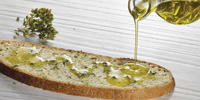
The Final Proof: July 2011
June 22, 2011
By
Jane Dummer
It’s amazing what one can learn at the equivalent of a wine tasting for
olive oil. I found a bounty of pressed stuff to taste and hear about
while walking the floor at May’s SIAL show in Toronto. SIAL Canada runs
the only international food industry event in our country.
Discovering the many varieties of extra virgin olive oil is a pleasure for the mind and the senses, a sure-fire way to bring fresh ideas into your bakery.
It’s amazing what one can learn at the equivalent of a wine tasting for olive oil. I found a bounty of pressed stuff to taste and hear about while walking the floor at May’s SIAL show in Toronto. SIAL Canada runs the only international food industry event in our country. For its sixth edition, the olive oil area was revamped and featured a number of extra virgin olive oil stars and Olive D’or award winners. Olive oil’s big presence at the show, fuelled by Italy being the country of honour, is timely. As people grow more health conscious, many are turning to the Mediterranean diet in order to eat healthy without feeling like they’re depriving themselves.
Research suggests that virgin olive oil is known for its heart healthy properties including reducing cholesterol. A traditional Mediterranean diet has shown some protection against other chronic diseases by decreasing inflammation. This has been partially attributed to a high intake of virgin olive oil. Virgin olive oil contains numerous phenolic compounds that exert potent anti-inflammatory actions in the body. A great appetizer originating in the Mediterranean that fits perfectly with healthy eating is bread dipped in extra virgin olive oils, a healthy, tasty alternative to more processed boxed appetizers.
 |
|
| Olive oils can add distinctive flavours to baked products.
|
“Use extra virgin olive oils only for dipping, drizzling and salads and then regular olive oil for cooking and baking,” suggests Simo Benkirane, director of Star Olive (a company based in Morocco with a location in Montreal), who was an exhibitor at SIAL. “Pure extra virgin olive oil, to the International Olive Oil Council (IOOC) standards, has a high amount of polyphenols, which are known for their antioxidant properties. Cooking and/or baking with an extra virgin olive oil will destroy some of the heat-sensitive antioxidants.”
Benkirane went on to note with concern: “There are not strict standards in Canada defining the term extra virgin olive oil compared to other countries. To give you an example, in Morocco, there are only five olive oils that qualify as ‘extra virgin’, with one being from our company.”
One exhibitor told me that olive oil comes from what we call the “tree of peace.” It is a noble product, rich in diversity and expressions. Like wine, it carries the character of the land it was grown on and the traditional know-how of the people who cultivate it. It was such an educational gathering for me. Each one I tried had a distinct flavour, aroma, texture and colour. I could taste flavours such as basil, green apple and almonds. Colours were rich golds to light greens. The quality and care that was put into these delicious products from the farm to the pressing was obvious.
Rob Benard, vice-president operations at Première Moisson, has been in the baking industry for over 25 years. He refers to olive oil as the gold standard and staple of bread making. Bernard considers the flavour of first pressed olive oil to be outstanding plus it has an incredible fatty acid profile.
“Olive oil is more soluble than other oils, which lends to the positive enhancement of the gluten molecule producing a better texture.”
At Première Moisson, all breads are made with high-quality olive oil, of which there is a daily tasting to verify its properties. Annually, there is an organized review and taste testing with their olive oil suppliers to confirm quality, taste and colour. The olive oil Première Moisson uses as an ingredient is also sold as a product in its store for consumers to enjoy.
I’ve always known about the health properties of extra virgin olive oil. But now, from my experience at SIAL, I have a better understanding of how the oils are created. It is a very fascinating industry directly related to baking, from offering flavourful dips for a variety of breads to being a “gold standard” ingredient in artisan bread making.
Jane Dummer, RD, is a leading dietitian for the Canadian food and nutrition industry. Jane offers services specializing in agri-food, functional foods and food safety. For more information, visit www.janedummer.com .
| Making the grade The International Olive Oil Council, a 23-member intergovernmental organization based in Madrid, Spain, governs the classification of olive oil. The council requires that all virgin olive oils are washed, decanted, run through a centrifuge and filtered under controlled conditions in order to prevent alterations in the composition of the oil. The IOOC recognizes three varieties of virgin olive oil as fit for human consumption: • Extra virgin olive oil, with a free acidity of no more than 0.8 grams of oleic acid per 100 grams. • Virgin olive oil, with a free acidity of no more than 2.0 grams of oleic acid per 100 grams. • Ordinary virgin olive oil, with a free acidity of no more than 3.3 grams per 100 grams. For more information, visit www.internationaloliveoil.org. |
Print this page
Leave a Reply